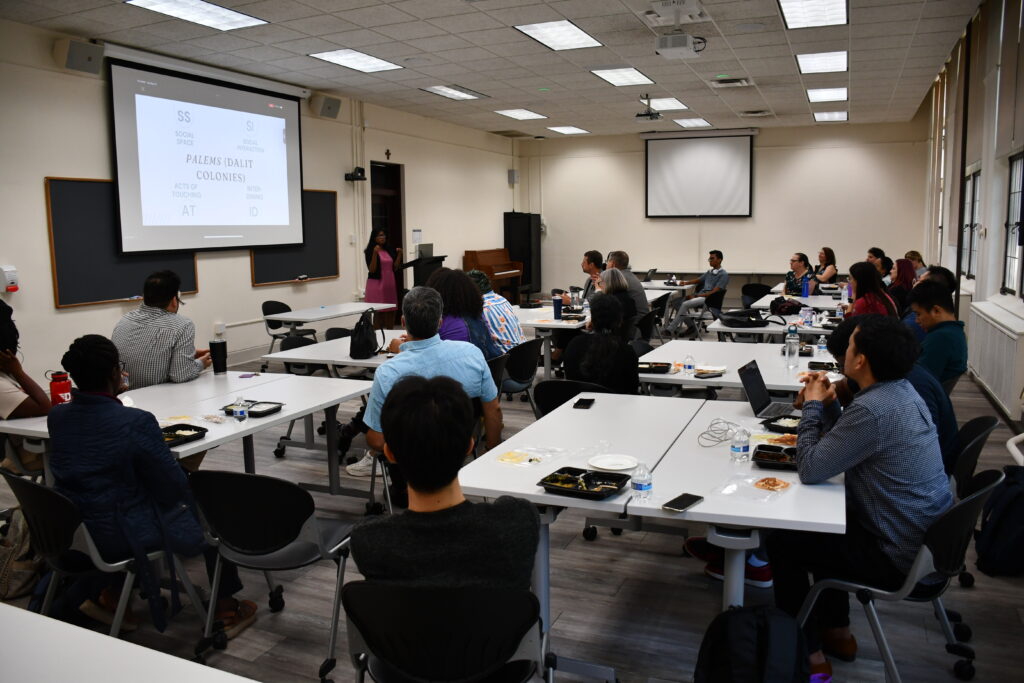Intimate Community of Global Perspectives
December 19, 2024
A Reflection on the Fall 2024 Let’s Talk Globally Sessions

Emotional proximity is one of seminary education’s hallmark features. The commitment to dialogue and rigorous ethical reflection, combined with small class sizes, create a learning environment where students become acutely familiar with each other’s thoughts and feelings. Together, the community collectively discerns both individual vocations and the work to which God calls the Church. One of the distinctive qualities of a Garrett education, however, is the way those same factors also offer nuanced perspectives on issues affecting people throughout the world and the ecumenical church. With faculty and students hailing from more than twenty countries across five continents, the global church is present in the room. This incredible blessing is particularly highlighted in the monthly “Let’s Talk Globally,” conversation series, when the community gathers for a meal as international students and faculty learn and teach about issues affecting their home country.
In too many educational institutions, international students’ experience is pushed to the periphery of communal life, subordinated beneath U.S. perspectives and concerns. This program flips that dynamic on its head, recognizing that international students bring a wealth of knowledge that can enrich all learners. Decolonizing theologies also demand decolonizing pedagogy; this series is one way Garrett lives into that commitment. But it’s also a recognition that transformation happens when we strengthen interpersonal relationships. That’s why the gathering always happens over food, to start a conversation that will continue after the event ends. It’s also a chance to correct media bias: As Dean of Students Thehil Russelliah Singh shared in opening this year’s first gathering, “Let’s Talk Globally helps international students—experts on their own context—share news with the wider community that may not get as much media attention in the U.S.”
In the September gathering, Ph.D. student Hannah Grace Injamuri offered a presentation about Dalit Christianity in Southern India, outlining both the caste system’s historic harms and why Christianity became a powerful and liberating faith for Dalit communities. “When Dalits converted to Christianity, they used scripture to advocate for their rights,” she said. “Using education, they began to blur social boundaries to move from being dehumanized to being considered children of God—a drastic change in how they were viewed by themselves and others.” Since Dalits were treated as untouchable within the caste system, Injamuri described how even the simple act of touching was a revolutionary change to affirm their humanity. But Injamuri also outlined the ways that Dalit Christians experience ongoing persecution from the Hindu nationalist government. “Dalit Christians face another layer of oppression being both outcaste and part of a minority religion,” she noted. “And Dalit women face triple oppression, often deprived of education, employment and justice . . . and much more likely to suffer from sexual violence.” While Injamuri named these painful realities, she also described the agency Christian faith has offered Dalit communities—exactly the type of nuanced presentation the “Let’s Talk Globally” format fosters.
In October, Ph.D. students Yichen Liang and Yongjiang (Cici) Zhou were joined by Dr. K. K. Yeo, Garrett’s Harry R. Kendall Professor of New Testament, to describe Chinese Christians’ historic and present struggles. Yichen began with descriptions about how the cultural revolution prohibited religious activities and persecuted clergy members, and the ways that shifted in subsequent years. “The 1982 Constitution provides a legal basis for broad changes to Chinese social and economic institutions, which reflects a new attitude towards religion,” she explained. “In this new relaxed climate for religion, Chinese churches started to grow rapidly.” Yongjiang complicated this optimistic picture, however, as she described the recent rise in state persecution. Starting in the mid-2010s, thousands of crosses affixed to churches were systematically removed and destroyed. “Many pastors were arrested and imprisoned because of their resistance,” she said. “Today, children under the age of 18 are forbidden from entering churches, no Christian teachings can be shared on social media, and churches and seminaries are required to spend time teaching patriotic education.” In conclusion, Dr. Yeo described the way these policies demand Chinese Christians to dedicate their primary loyalty to the Chinese government, not God—a clear violation of how the gospel calls Christians to live. “These are our brothers and sisters in Christ,” Dr. Yeo lamented, calling for solidarity.
We cannot be a global church without learning about the issues that affect our global neighbors. And we cannot be a learning community that welcomes international students without centering concerns they bring from their home countries. When we commit to this work, however, the entire seminary receives an incredible gift: an interconnectedness that mirrors God’s broader desire for humanity. In a world torn by ethnic struggles, religious conflict, persecution and war, we can model how dialogue seeds collaboration and belonging. Deeply entrenched problems do not have simple solutions, but all change begins with a commitment to one another’s flourishing, and initial steps to set us on that path.

